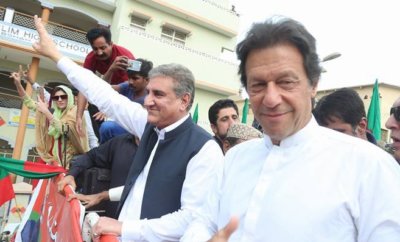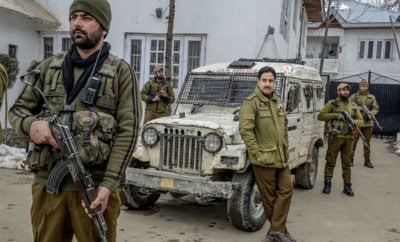Politics
Skipping Dinner, Imran Khan Takes Helm in Pakistan Pledging Austerity

Pakistani Prime Minister Imran Khan
Photo: Twitter/ @ImranKhanPTI
Imran Khan, the former cricket star turned firebrand politician, was sworn in as Pakistan’s prime minister Saturday, taking control of a country facing a looming economic crisis as observers questioned whether he had the political acumen to govern a deeply divided nation.
Khan’s first decision was to scrub the nine-course meal traditionally served after the oath-taking ceremony, held at the president’s house. It was a sign of the “austerity drive” he had promised while on the campaign trail, his party said. Instead, refreshments were served in the grand hall of the residence.
Since winning the July 25 election, Khan has stressed that he would lead a lean life, shunning the ostentatious displays of power and wealth of his predecessors. He has said that he will not live in the prime minister’s house, a lavish, white marble building on a hilltop overlooking Islamabad.
Instead, he vowed to take a smaller house belonging to the military secretary. Khan, however, maintains a sprawling, private Mediterranean-style villa nearby.
Whether his campaign rhetoric will match the policies he pursues will be closely watched; as a politician, he has been criticized as relying on style over substance. On the campaign trail, he vowed to establish an Islamic welfare state and to build millions of housing units. Those promises will bump up against the reality that Pakistan’s government has little money to spare, is straddled with debt and must tighten its finances.
“The main challenge is economic,” said Ayaz Amir, a former lawmaker and noted Pakistani columnist. “There’s not much money in the kitty, and there are a lot of debts coming due both in the immediate and long term.”
Amir added: “He will be judged by what kind of people he appoints to key ministries — this will be crucial. And he has many other advantages: People look upon him as a clean leader with no legacy of corruption attached to his name, and he’s popular enough to withstand populist demands.”
If Khan completes his five-year term, he would be the first prime minister in Pakistan’s history to do so.
The new prime minister has said he would break the dynastic nature of Pakistani politics and promised to bring young, dynamic leadership to his government. Instead, he has so far elevated into key roles some of the same politicians he had denounced in the past over their political opportunism and checkered records on corruption.
Khan, 65, announced his Cabinet appointments hours after the swearing-in ceremony Saturday. The list did not include appointments for the ministries of interior and power, leaving Khan in control of those portfolios. Observers warned that leaving those ministries under Khan’s purview was a mistake, with the country suffering from an acute electricity shortage and needing special attention and expertise.
Asad Umar, a private-sector businessman whom economists view as a populist with a thin grasp of the challenges ahead, was named as finance minister.
Pakistan’s current account deficit stands at $18 billion, while its foreign-currency reserves are just $10.1 billion, enough to cover two months of imports. Just days after the election, China gave Pakistan a $2 billion loan to help shore up its finances, following $1 billion given by Chinese banks in April. And more money is needed, soon.
One of the first tests facing Khan is whether to ask the International Monetary Fund for a bailout or to extend another open palm to China, deepening Pakistan’s economic reliance on its larger neighbor. Pakistan already relies on China to develop critical infrastructure projects worth some $62 billion, with onerous loan terms and profit-sharing agreements benefiting Beijing.
Pakistan will start negotiations with the IMF in the coming weeks and will ask for loans worth up to $12 billion, officials say, part of a four-year program that will require the country to undertake privatization measures and tighten its fiscal policy. Pakistan has taken 14 bailouts from the fund since the 1980s.
If Khan’s government pursues an IMF bailout, he will have to explain to voters why the populist measures he promised will no longer be possible under the fund’s lending terms.
Saturday’s swearing-in ceremony was the second democratic transfer of power in Pakistan since it was founded in 1947. The military has ruled for about half the country’s history through a series of coups.
Before the election, the military was accused of propping up Khan by censoring the news media and influencing Pakistan’s courts in order to disqualify and jail the last elected prime minister, Nawaz Sharif, on corruption charges, which were seen as politicized.
The vote was also fraught with irregularities, according to the opposition. And an observation team from the European Union determined the campaign in the lead-up to the election had a had a “lack of equality” for all parties.
Khan takes over at a time when Pakistan finds itself increasingly isolated on the global stage. Washington froze aid to the country this year, citing the military’s ties to extremist groups fighting in Afghanistan, complicating the United States’ war effort there.
In June, a global anti-terrorism watchdog group put Pakistan on a “gray list” for not doing enough to clamp down on terrorist groups at home. That listing will complicate and make more expensive Pakistan’s ability to raise money on international markets.
Whether Khan can assert control over Pakistan’s foreign and defense policies will be another crucial test of how successful his government will be. The military has typically controlled those domains, and Khan’s objectives — such as brokering peace in Afghanistan and pursuing talks with India, a longtime rival, will need the military’s approval.
Khan “needs to sit down with the military and figure out what are the national security objectives,” said Ikram Sehgal, an independent analyst and retired Pakistani military officer. “Everyone should be on the same page.”
He added: “We need to fix the U.S.-Pakistan relationship. We cannot afford to be in either the U.S. or the China camp. We need to be neutral and friendly with everyone.”
Although Pakistan’s main political parties all agree that the economy is the top priority, whether Khan can cobble together the needed support will be a challenge. He was voted in as prime minister by Parliament on Friday, with 51 percent of the vote. As he took the floor to make his acceptance speech, opposition lawmakers began chanting slogans against him.
Khan quickly lost his cool, calling his opponents corrupt in a divisive speech. His party crowded around him ululating and mocking the opposition. The image was reminiscent of Khan’s political start: leading anti-government demonstrations while chanting from atop cargo containers.
It was not the image that many had expected Khan to project: a new, composed prime minister. The tirade was a break from the conciliatory note he had taken in a national address just after his party won the elections.
“He simply doesn’t have it; he doesn’t have the temperament to deal with dissent,” said Khurram Dastgir-Khan, a sitting opposition parliamentarian who served as the defense minister in the previous government.
“That is why he abandoned whatever high-minded speech he planned and went back to his fiery accusations. He was elected with a razor-thin majority. This is our new leader, a man who will struggle to negotiate with Parliament to get support for his policies,” he added.
During Saturday’s swearing-in ceremony, Khan stumbled as he repeated the oath, and was immediately denounced by opponents for not being prepared. But his followers praised his humility.
There were other stumbles. When Parliament was inaugurated Monday, Khan forgot the national identification needed to enter the session. The speaker of the House had to grant him special permission to enter and to take his oath alongside fellow parliamentarians.
“This wasn’t the most auspicious of beginning for this Parliament,” said Amir, the analyst, adding, “He has to make the transition from opposition leader to the leader of Pakistan.”
© New York Times 2018



